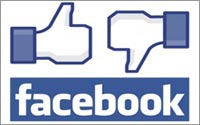 Facebook stumbled out
of the gate in May with a botched IPO, disappointing growth and a tumbling stock price. It fared better in reporting quarterly
earnings for the first time as a public company on Thursday, but did little to dispel questions about its revenue growth.
Facebook stumbled out
of the gate in May with a botched IPO, disappointing growth and a tumbling stock price. It fared better in reporting quarterly
earnings for the first time as a public company on Thursday, but did little to dispel questions about its revenue growth.
The social networking giant posted revenue of $1.18 billion in the
second quarter -- up 32% from a year ago, but down from the 45% growth in the prior quarter. It also marked the fifth consecutive quarter of declining revenue growth for Facebook.
The company
reported a profit of $157 million, or 8 cents a share. On an adjusted basis, Facebook reported a profit of $295 million, or 12 cents a share. That compares to $285 million, or 12 cents a share, a year
ago.
advertisement
advertisement
Analysts, on average, had forecast earnings of 12 cents a share on revenue of $1.15 billion.
Facebook’s initial earnings report since its May 17 IPO is seen by Wall Street as
a key early benchmark for the company. There are concerns about the slowing pace of growth, its ability to monetize its growing mobile audience and the overall quality of advertising on the site.
Since March, Facebook has taken steps to ramp up its ad offerings, including a new set of premium ad formats, extending its Sponsored Story ads to mobile devices and announcing plans for a
real-time bidded ad exchange to target ads based on users’ Web browsing
history.
Most recently, Facebook has signaled it intends to roll out its own ad
network.
But most of these changes have not taken full effect yet. In the second quarter, Facebook’s ad revenue, which accounts for 84% of total revenue, increased 28% to $992
million from a year ago. That compares to a gain of 37% in the first quarter of 2012, and 83% in the year-earlier period.
Analysts have focused on Facebook’s ability to make money from
its rapidly growing mobile audience. On Thursday, the company said the number of monthly mobile users had reached 543 million at the end of June -- up 67% from a year ago, and 11% from the first
quarter.
Data from AdParlor this week showed click-through rates are 15 times higher on mobile, but 30% cheaper than traditional ads on Facebook. The conversion rate is also 16% lower for
mobile ads.
Still, Facebook CFO David Ebersman said the trend of ad impressions grew more slowly as users continued to shift to mobile devices. “This trend is particularly true in
markets such as the U.S. where smartphone use is expanding rapidly,” he said. Smartphone penetration has hit about 50% in the U.S.
Beyond advertising, Facebook is looking for other ways
to make money in mobile. In June, it launched its own App Center to better showcase apps and enable developers to sell apps and offer their wares on a subscription basis. That could generate
additional revenue for the company over time, since Facebook takes a cut of developer sales.
Zuckerberg stressed that Facebook would continue to invest heavily in new mobile initiatives and
products.
But that investment apparently will not go toward creating a Facebook phone. Zuckerberg said during the Q&A session with analysts that it didn’t make sense for Facebook to
develop its own phone.
Facebook executives also emphasized the value of social advertising during the call, focusing on results with Sponsored Stories. The format allows marketers to turn
users’ organic posts on Facebook into ads. Facebook COO Sheryl Sandberg said Sponsored Stories ads appearing in the news feeds drive much higher engagement rates than ads on the right side of
the page.
The ads are generating $1 million a day, with about half coming from mobile. Advertisers have also shown a lot of interest in Sponsored Stories as a mobile-only buy. eMarketer has
predicted that business could eventually bring in $2 billion a year for the company and provide a big lift to earnings.
A recent survey of 400 marketers by Citigroup and Ad Age found
55% don’t consider Facebook critical or necessary to their ad efforts. But the study also found that a large number of brand marketers expect to increase their ad spend with the social network
over time.
Investors were hardly impressed with Facebook’s quarterly results as its shares fell about 8.5% in after-hours trading to just under $27 a share. That’s well below the
$38 a share at which it went public.